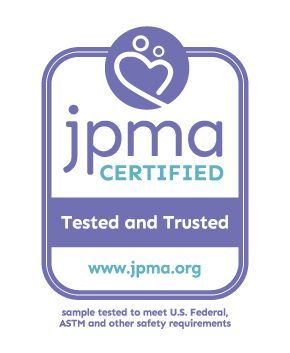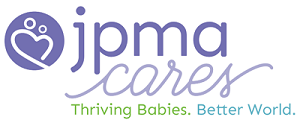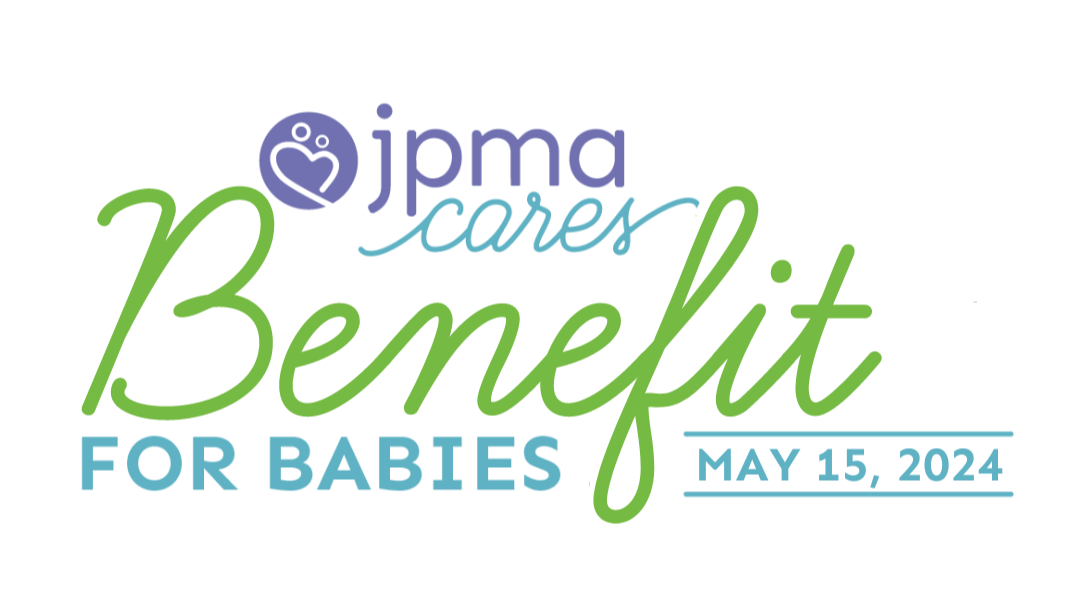JPMA 认证经过测试并值得您的家人信赖
作为婴儿和儿童产品质量和安全行业的代言人,JPMA 帮助您为您的家庭选择和使用最好的婴儿产品。 JPMA 屡获殊荣的认证计划测试了 29 个不同类别的 2,500 多种产品,以确保产品符合性能安全的最高标准。您的产品或包装上的 JPMA 认证印章表明它已经过所有联邦和州法规、自愿法规的测试。 ASTM 标准以及其他主要零售商的要求,均由 CPSC 认可的独立实验室进行。 JPMA 认证的产品每年都会根据最新标准进行测试,以获得更多保证。可以获得 JPMA 认证的产品类别包括:
婴儿监视器
摇篮/摇篮
浴室座椅
浴缸
沐浴者
床头枕
橱柜安全锁和插销
马车/婴儿车
换尿布台
儿童折叠椅
婴儿床床垫
可扩展的门和外壳
喂养加高座椅
框架婴儿背带
全尺寸婴儿床
手持式婴儿背带
高脚椅
婴儿摇椅
婴儿地板座椅
婴幼儿摇椅
婴儿秋千
婴儿学步车
玩码
便携式床栏
便携式挂钩椅
吊带架
软质婴儿背带
固定式活动中心
幼儿床
如果一家公司参与某个特定类别,则该类别中的所有模型都会经过测试并获得 JPMA 认证。换句话说,如果一家公司被列为婴儿车和婴儿车类别认证企业,那么该公司的所有婴儿车(无论款式、颜色等)均已获得 JPMA 认证。按类别或按制造商查看 JPMA 认证产品目录中的认证计划参与者及其类别的完整列表。JPMA 认证产品经过测试且值得信赖,让家长在为孩子购买最安全的产品时高枕无忧。购买婴儿时请注意 JPMA 认证印章!

您有 JPMA 认证的婴儿床并需要更换零件吗?检查跟踪标签!虽然 JPMA 对产品进行安全认证,但他们不生产婴儿床或更换硬件。婴儿床的跟踪标签通常位于婴儿床腿之一的内侧。它将包含以下信息:制造商或品牌名称生产地点原产国制造日期批号一旦获得此信息,您可以访问制造商的网站索取更换零件、查看说明手册和警告等。如果您对产品有任何疑问JPMA 认证计划或需要更多信息,请通过 jmcghee@jpma.org 或 (703) 299-8212 联系 JPMA 认证与标准助理 Jailynn McGhee。
JPMA 认证常见问题解答
What is JPMA Certification? What does a JPMA Certification Seal mean?
Baby and children’s products must meet minimum federal requirements based on safety and use. The JPMA Certification Seal signifies a product meets these and additional requirements. To become certified, each product is sample-tested at an independent laboratory to verify it meets the highest standards for safety, performance and functionality.
JPMA Certification is voluntary, and it is based on adherence to ASTM standards, federal and state laws and some retail requirements. The program is designed to provide peace of mind to parents that these products have been independently tested to the most stringent standards.
What chemical testing is included in the JPMA Certification Program?
The JPMA Certification Program tests to all federal and state chemical safety requirements for juvenile products. Our protocols require compliance with all 50 states, regardless of where the product is sold. These requirements restrict chemicals such as lead, cadmium, mercury, antimony, flame retardants, phthalates and more.
What is ASTM? Are ASTM’s standards required?
ASTM International, formerly known as the American Society for Testing and Materials (ASTM), is a globally recognized leader in the development and delivery of international voluntary consensus standards. Today, thousands of ASTM standards are used around the world to improve product quality, enhance safety, facilitate market access and trade, and build consumer confidence. The JPMA Certification Program is built on ASTM standards. ASTM standards do not widely address chemical safety but are focused on performance and general requirements. ASTM standards are voluntary, but the JPMA Certification Program and many federal rules for juvenile products rely on the ASTM standard as the basis for their own requirements.
What is the CPSC? What does it mean to test to CPSIA?
The Consumer Product Safety Commission (CPSC) is the federal agency tasked with regulating consumer products. Despite its huge responsibility, the CPSC does not (and cannot) certify or test each individual product on the market. The CPSC has rulemaking and enforcement tools to help regulate consumer products. Signed into law in 2008, the Consumer Product Safety Improvement Act (CPSIA) gave the CPSC a significant role in creating and enforcing federal requirements as they pertain to children’s products. Testing to CPSIA means that a manufacturer meets or exceeds the federal requirement for their product. All JPMA Certified products must test to the applicable federal regulation.
What is the difference between JPMA Certification and GreenGuard Certification?
There are various differences between the two programs. Primarily, JPMA does not create its own requirements, but rather relies on federal, state, ASTM and major retailer requirements to make up its testing protocol. The JPMA Certification Program is a third-party verifier that a company has met or exceeded all of these safety requirements. GreenGuard Certification is more focused on chemical safety and is in addition to existing regulations. Many JPMA Certification Program participants are also GreenGuard Certified.
What is the difference between JPMA Certification and UL Verification?
Underwriters’ Laboratories, or UL as it is universally known, tests and evaluates a variety of products and components. UL’s label on electronics and small appliances is the most recognizable. It means that the product has been found to be free from a reasonably foreseeable risk of fire or electric shock in most environments. The JPMA Certification Program verifies compliance with the UL program for any products that have an electrical component.
What is Prop 65? Why is there a Prop 65 warning on my baby product?
Proposition 65 requires businesses to provide warnings to Californians about possible exposures to chemicals that cause cancer, birth defects or other reproductive harm. California’s Office of Environmental Health Hazard Assessment (OEHHA) maintains the list of Prop 65 chemicals that it considers harmful, and it updates the list at least once a year. At the latest count, the Prop 65 list contained more than 900 chemicals. These warnings are on a wide range of products and have to be posted in California businesses as well, if applicable. Despite being specific to California, all JPMA Certified products are required to have the Prop 65 warning. For many products, this warning is included if there is the slightest possibility of contamination during the manufacturing process.
What are PFAS? Are juvenile products regulated for PFAS?
PFAS are widely used, long-lasting chemicals, the components of which break down very slowly over time. There are thousands of PFAS chemicals, and they are found in many different consumer, commercial and industrial products—primarily outerwear, cooking pots and pans, and other waterproof or stain-resistant materials. This makes it challenging to study and assess the potential human health and environmental risks. Baby products are regulated for PFAS chemicals, primarily through state laws such as those in California and Colorado. Many baby product manufacturers do not add PFAS to their products, and other JPMA Certification Program is an added level of security to ensure they are compliant with the most current PFAS regulations. PFAS are widely used, long-lasting chemicals, the components of which break down very slowly over time. There are thousands of PFAS chemicals, and they are found in many different consumer, commercial and industrial products—primarily outerwear, cooking pots and pans, and other waterproof or stain-resistant materials. This makes it challenging to study and assess the potential human health and environmental risks. Baby products are regulated for PFAS chemicals, primarily through state laws such as those in California and Colorado. Many baby product manufacturers do not add PFAS to their products, and our Certification Program is an added level of security to ensure they are compliant with the most current PFAS regulations.
What are phthalates? Are JPMA Certified products tested for phthalates?
Phthalates (pronounced THAL-eights) are a class of chemicals that are used to make plastics flexible [primarily polyvinyl chloride (PVC or vinyl)]. The chemicals also serve various functions in cosmetics, personal care and cleaning products. JPMA Certified products are tested for phthalates, as required by state and federal regulations.
What are flame retardants? Are JPMA Certified products tested for flame retardants?
Flame retardants are chemicals that are applied to materials to prevent the start or slow the growth of fire. They have been used in many consumer and industrial products since the 1970s to decrease the ability of materials to ignite. JPMA Certified products are tested for flame retardants in accordance with various state regulations.
What are VOCs? Does the JPMA Certification Program test for VOCs?
Volatile organic compounds (VOCs) are compounds that have a high vapor pressure and low water solubility. Many VOCs are human-made chemicals that are used and produced in the manufacture of paints, pharmaceuticals and refrigerants. An example is formaldehyde, which is regulated at both the federal and state level. JPMA Certified products are tested for formaldehyde, which is required by the EPA and various states.
Are JPMA Certified products tested for lead, cadmium or mercury?
Yes, JPMA Certified products are tested for lead, cadmium and mercury, which is required by federal and state regulations.
Are car seats tested for chemicals?
The JPMA Certification Program does not currently include a car seat category, as there is no ASTM standard for car seats. Car seats are regulated by the National Highway Traffic Safety Administration (NHTSA). Federal Motor Vehicle Safety Standard (FMVSS) 213, through incorporation of FMVSS 302, requires that car seats have flame retardant properties, and this is often solved by using chemicals. Many car seat manufacturers work to find chemical-free ways to protect families from the risk of fire in vehicles, while still complying with NHTSA’s flame retardancy requirements, and they make certain models or fashions without these chemical treatments. Learn more about car seat safety here.

















